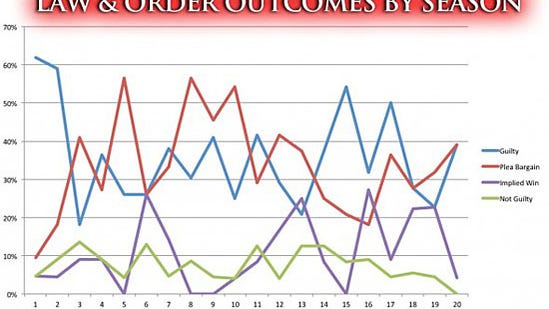Join or Sign In
Sign in to customize your TV listings
By joining TV Guide, you agree to our Terms of Use and acknowledge the data practices in our Privacy Policy.
The Deep Insights We've Learned From Every Law & Order Verdict
In 2010, Law & Order concluded its run after 20 seasons and 456 episodes. But while Jack McCoy might have hung up his hat, the show has lingered on thanks to the magic of syndication. While most of us sit around watching reruns, seeing nothing but our old friends Lenny and Fontana, one man saw something else: a cultural time capsule.
In 2010, Law & Orderconcluded its run after 20 seasons and 456 episodes. But while Jack McCoy might have hung up his hat, the show has lingered on thanks to the magic of syndication. While most of us sit around watching reruns, seeing nothing but our old friends Lenny and Fontana, one man saw something else: a cultural time capsule.
From Firefly to Supernatural: Which TV show has the best fans?
OverthinkingIt.com's Matthew Belinkie has compiled the verdicts from every Law & Order episode in an effort to analyze their outcomes in relation to real-world events. So after two years of hard work and hours on Excel, what exactly did he find?
Turns out, a whole heck of a lot! One of the most interesting things Belinkie's analysis brings to light is the inverse relationship between Law & Order's viewership and case success rate per season (which includes every story line where the D.A. is satisfied with the outcome). When the two are compared, it becomes clear that Law & Order reached its highest rate of success in Season 17, exactly when the series hit an all-time ratings low — no mere coincidence, according to Belinkie.
<
Over its double-decade lifespan, Law & Order survived countless historic events which affected the national landscape and attitude, changes which Belinkie believes are reflected in the series.
Don't agree with People's choice? Who do you think is the Sexiest Man Alive?
The mid-point of Law & Order's run came at one of the biggest crises of the 21st century: September 11, a tragic event which Belinkie says inspired a more unified, idealistic era in both the population and the procedural. "You can see there's a little bit of a spike [after Sept. 11]... then you get to the middle of the 2003-2004 [season], where there's no end in sight in Iraq and Afghanistan and there's a really contentious election. The national mood becomes much more pessimistic and you can see [the success rate] drops around Season 14."Though incredibly extensive, Belinkie never claims his data has any definitive answers. "I'm sure I could find out the baseball performance of the New York Yankees is directly correlated with the Law & Order results if I looked at the data hard enough," he jokes. "I don't want to sound like I believe I uncovered the Da Vinci Code in Law & Order. It's just for fun."And he isn't kidding! Studies like this are just a fun side-hobby for Belinkie, who works as a project manager for a test prep company by day and plays at being a serious cultural theorist by night.Check out all of Belinkie's graphs and findings here. What do you think of his theories? Do you prefer successful cases or the ones in which justice isn't always achieved?
